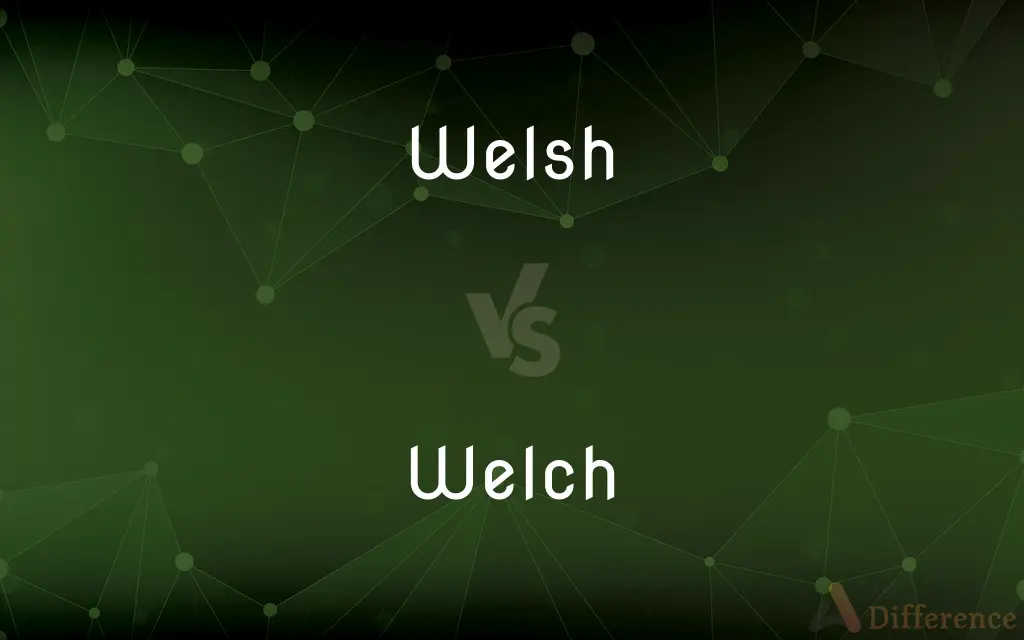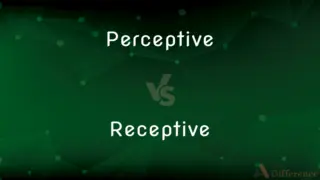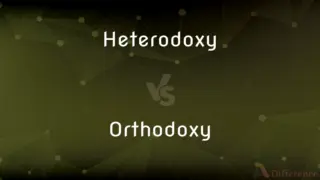Welsh vs. Welch — What's the Difference?
By Tayyaba Rehman & Maham Liaqat — Updated on March 27, 2024
Welsh is a Celtic language spoken in Wales, while "welch" refers to failing to honor a commitment or debt.

Difference Between Welsh and Welch
Table of Contents
ADVERTISEMENT
Key Differences
Welsh is a language with its roots in Celtic history, primarily spoken in Wales and parts of Argentina. It is known for its unique sounds, extensive use of consonants, and historical significance to Welsh identity and culture. On the other hand, "welch" (often spelled "welsh" in non-standard contexts) is a verb used in informal English to describe the act of reneging on a promise, bet, or debt. This term does not relate to the Welsh people or language but is a separate concept entirely.
Welsh boasts a rich literary tradition, with medieval texts such as "The Mabinogion" and modern works contributing to its cultural depth. Welsh literature is celebrated for its poetry, prose, and plays, deeply intertwined with the nation's history and identity. Whereas, the concept of welching does not pertain to any cultural or literary tradition but is a colloquial term often considered derogatory or informal in nature.
The Welsh language is subject to revival efforts, with increased interest in learning Welsh, promoting its use in education, and its presence in media. These efforts aim to preserve and invigorate Welsh as a living language. In contrast, the act of welching is universally discouraged and looked down upon in societal transactions, highlighting a breach of trust or failure to meet obligations.
Welsh has its own standardized orthography, which includes letters not found in English, such as "ll" and "ch," contributing to its distinctive phonology. Meanwhile, "welch" follows standard English spelling conventions and does not have any unique orthographic characteristics.
The preservation and promotion of the Welsh language are often supported by government initiatives, cultural organizations, and educational programs, emphasizing its importance to Welsh heritage. Conversely, the term "welch" does not receive any institutional support or promotion, as it represents a negative action contrary to societal values of integrity and reliability.
ADVERTISEMENT
Comparison Chart
Definition
A Celtic language spoken in Wales.
To fail to honor a commitment, bet, or debt.
Cultural Significance
Integral to Welsh identity and heritage.
No cultural significance; considered negative.
Usage
In spoken and written communication within Welsh communities.
Informal contexts to describe reneging on agreements.
Orthography
Unique letters like "ll" and "ch."
Standard English spelling.
Societal View
Subject of revival efforts and cultural pride.
Viewed negatively as a breach of trust.
Compare with Definitions
Welsh
A Celtic language native to Wales.
Welsh is taught in schools across Wales to preserve the language.
Welch
To fail to pay a debt.
He welched on his promise to pay back the loan.
Welsh
Has its own set of vowels.
Welsh uses w and y as vowels in certain contexts.
Welch
To back out of a deal.
She felt cheated when her partner welched on the agreement.
Welsh
Known for its distinct phonology.
Welsh has sounds that are unique compared to English.
Welch
Used informally.
Welching on a bet is frowned upon in many circles.
Welsh
Spoken by over 500,000 people.
She speaks Welsh fluently, using it daily.
Welch
Indicates a lack of integrity.
To welch on a commitment is seen as untrustworthy.
Welsh
Features a double "ll" sound.
The Welsh word Llanelli demonstrates the unique ll sound.
Welch
Has no linguistic or cultural heritage.
Welch is unrelated to the Welsh language or people.
Welsh
Fail to honour (a debt or obligation incurred through a promise or agreement)
Banks began welshing on their agreement not to convert dollar reserves into gold
Welch
Variant of welsh.
Welsh
Relating to Wales, its people, or their language.
Welch
A person who defaults on an obligation, especially a small one.
She's a welch. That watering-can isn't hers: I lent it to her three years ago.
Welsh
The Celtic language of Wales, spoken by about 500,000 people (mainly bilingual in English). Descended from the Brythonic language spoken in most of Roman Britain, it has been strongly revived after a long decline.
Welch
To fail to repay a small debt.
Welsh
The people of Wales collectively.
Welch
To fail to fulfill an obligation.
Welsh
Of or relating to Wales or its people, language, or culture.
Welch
See Welsh.
Welsh
The people of Wales.
Welsh
The Celtic language of Wales. Also called Cymric.
Welsh
To swindle a person by not paying a debt or wager
Welsh on a bet.
Welsh
To fail to fulfill an obligation.
Welsh
To cheat or swindle someone, often by not paying a debt, especially a gambling debt.
Welsh
To go back on one's word.
Welsh
Of or pertaining to Wales, or its inhabitants.
Welsh
The language of Wales, or of the Welsh people.
Welsh
The natives or inhabitants of Wales.
Welsh
To cheat by avoiding payment of bets; - said esp. of an absconding bookmaker at a race track.
Welsh
A native or resident of Wales
Welsh
A Celtic language of Wales
Welsh
Welsh breed of dual-purpose cattle
Welsh
Cheat by avoiding payment of a gambling debt
Welsh
Of or relating to or characteristic of Wales or its people or their language;
The Welsh coast
Welsh syntax
Common Curiosities
What is the origin of the Welsh language?
Welsh is a Celtic language with historical roots in the Brittonic languages of ancient Britain.
Can "welch" be considered offensive?
Yes, "welch" can be seen as offensive due to its negative connotations of dishonesty.
What is the significance of the Welsh language to Wales?
The Welsh language is a key part of Wales' national identity, culture, and heritage.
Is Welsh difficult to learn?
For non-native speakers, Welsh may present challenges due to its unique phonology and grammar, but it is learnable with dedication.
How many people speak Welsh?
As of the last surveys, over 500,000 people speak Welsh, primarily in Wales.
What are common reactions to welching?
Disappointment, mistrust, and sometimes legal action against the person who welched.
What does it mean to "welch on a bet"?
To "welch on a bet" means to refuse to pay money owed from a bet after losing.
Are there Welsh-speaking communities outside of Wales?
Yes, there are Welsh-speaking communities in Argentina, particularly in the Chubut Valley.
How is the Welsh language preserved?
Through education, media, and cultural initiatives aimed at promoting its use and teaching.
Is there a stigma attached to welching?
Yes, welching is generally viewed negatively as it signifies a failure to uphold one's word or financial obligations.
Is "welch" related to the Welsh people?
No, "welch" as a verb is not related to the Welsh people or language.
Are there initiatives to teach Welsh worldwide?
Yes, there are online platforms and international programs aimed at spreading Welsh language learning.
What happens if someone welches on a deal?
It often results in loss of trust and may have legal or social repercussions.
Does Welsh have its own alphabet?
Welsh uses the Latin alphabet with some additional letters unique to the language.
Why is learning Welsh encouraged in Wales?
To preserve and revitalize the language as a living part of Welsh heritage.
Share Your Discovery

Previous Comparison
Perceptive vs. Receptive
Next Comparison
Heterodoxy vs. OrthodoxyAuthor Spotlight
Written by
Tayyaba RehmanTayyaba Rehman is a distinguished writer, currently serving as a primary contributor to askdifference.com. As a researcher in semantics and etymology, Tayyaba's passion for the complexity of languages and their distinctions has found a perfect home on the platform. Tayyaba delves into the intricacies of language, distinguishing between commonly confused words and phrases, thereby providing clarity for readers worldwide.
Co-written by
Maham Liaqat














































